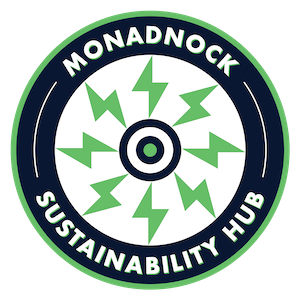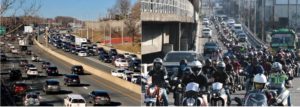by Gerald Burns, MSH Board member and Program Committee member.
Originally Published in The Monadnock Shopper News, Green Monadnock column, May, 2023.
Image credits: Jan Somma-Hammel (US photo) and Phil. Star (Philippines photo).
A few months back I did a Google search and came across an unexpected item: “Why is Manila sinking?” A timely question, as my wife and I were about to head to the Philippines to set up a second home there. The answer is basically climate change. Rising sea levels caused by global warming (compounded by groundwater pumping) are threatening to flood the capital region. Having had a little time now to survey climate prospects in this nation of 110 million people, I offer the following brief report, aiming to make it relevant to the U.S and the Monadnock region.
Those prospects are daunting. One recent study finds the Philippines to be the “country most at risk from the climate crisis.” Not only Manila but the many other coastal communities in the island nation are vulnerable to sea level rise. What’s more, twenty typhoons roar through each year, the strongest five ever recorded having happened since 2006. Other damage occurs more slowly: loss of coral reefs and mangrove forests, disruption of agricultural cycles.
Not surprisingly, Filipinos are aware of these developments. 93% percent report experiencing some impact of climate change. What are they doing about it? To casual observation, jamming the roadways with more and more vehicles powered by fossil fuels: pretty much what most Americans have been doing.
A closer look, though, shows that efforts are being made to address the crisis. The national government has signed on to the Paris and subsequent UN agreements, and recently made an ambitious pledge to reduce carbon emissions 75% by 2030–gestures undercut by the approval of 22 new coal mines and the budgeting of just 2.7% public funding toward the 2030 target. The private sector has undertaken some initiatives, however, and climate activism, especially among the younger generation, is robust. It has generated international attention and has led to productive action at the local level, as has happened in our region with, for example, the Drive Electric campaign coordinated by the Monadnock Sustainability Hub and Food Co-op.
But even at their most diligent, these efforts would not be enough. To grasp why this is so we need only to get beneath the surface of the earlier observation about road traffic. Yes, congestion and emissions are rising, but only a little over half of all Filipino households own a motor vehicle at all. And of this slim majority a full eight of ten ownerships are of small motorcycles. Compare this to the U.S., where 92% have their own wheels and the most popular ride is a pickup or SUV. The comparison suggests a) that the Philippines’ input to greenhouse gases (GHGs) is relatively small, and (b) that it is a relatively poor country. In these circumstances, the Philippines is not alone. By and large, the poorest countries generate the least GHGs, are most vulnerable to their impacts, and least likely to have the resources needed to deal with those impacts.
This pattern raises the issue, much debated in recent UN conferences, of the responsibilities of developing versus fully industrialized nations in responding to the climate crisis. It’s a complicated and often confusing debate. But seeing first-hand the situation here has set my mind straight on certain points. To ask an economically struggling society to meet the same pledges of carbon reductions that wealthy countries have set for themselves is not only unfair; it’s unrealistic. In order to do their part in meeting the challenge of climate change, such societies are going to need help—financial assistance, technology transfer, and planning expertise—from those best able to give it.
Certainly there is much that can jointly be done. For one, why not electrify that growing fleet of two-wheeled gas guzzlers? Good headway is being made on this objective elsewhere (Rwanda, for example), while in the Philippines the E-option makes up under 1% of the market. The task won’t be easy, and big-time inputs from international sources will be needed to accomplish it fully. But perhaps a people-to-people nudge could get things started. Who knows, there may be a region in the Philippines just waiting to hear of a Monadnock-style Drive-E campaign, tailored to motorbikes. I have someone in mind who can pass the word.
Gerald (Jerry) Burns, PhD, is emeritus English faculty at Franklin Pierce (FPU). At FPU, Jerry partnered in the establishment of the University’s Institute for Climate Action. He is a member of the Monadnock Region’s Citizens Climate Lobby and the Marlborough Energy and Community Power Committee, and when not in the Philippines, can usually be found Friday mornings at the Climate Strike in Jaffrey.

